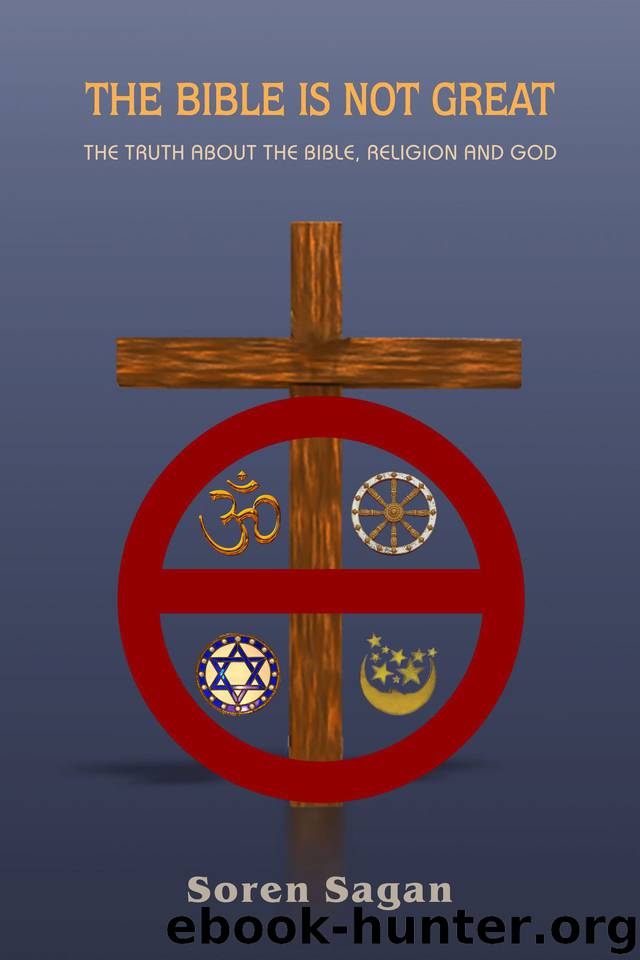The Bible Is Not Great: The Truth About The Bible, Religion And God by Sagan Soren

Author:Sagan, Soren [Sagan, Soren]
Language: eng
Format: epub
Publisher: Smart Cybernetics, Inc.
Published: 2014-11-25T16:00:00+00:00
SATAN
One of the most famous personalities in this world is Satan, or the devil. Satan is the root cause of all evil in the world, according to all Abrahamic religions. The major ones are Judaism, Christianity, and Islam. According to Abrahamic religions, Satan is the deceiver. He misguides people, he is an enemy of God, and he wants humanity to go astray and ultimately end up in hell. The main role of Satan, or the devil, is to turn people against God. The god, according to these religions, is the truth, and Satan is falsehood.
We will see that just like almost all the other myths of the Bible, the myth of Satan was also an adaptation based on earlier myths. The word “Satan” was actually taken from Roman mythology and was originally called Saturn, who was an enemy of Jupiter, the supreme god. Greek mythology, which is older than the Roman mythology adapted from it, had the names of Jupiter and Saturn as Zeus and Cronus respectively. Cronus heard a prophecy that one of his children was going to kill him and become the king in his place. In order to prevent this from happening, he swallowed his children as soon as they were born.
When Zeus was born, his mother Hera hid him in a safe place and gave Cronus a stone wrapped in cloth to swallow. Cronus thought he swallowed the child and Zeus was saved. When Zeus grew up, he waged a war against Cronus and his allies, which were Titans. The allies of Zeus were mostly Olympians. Zeus castrated Cronus and he entered a permanent sleep. He thus dethroned him and became the new king of gods.
Later, the stories from Greek mythology were adapted in Roman mythology but the names of gods were different. Stories from Greek mythology were adapted in Indian mythology as well when Aryans from central Asia went there and became Hindu Vedas. The story of conflict and rivalry between Jupiter and Saturn was also adapted in other mythologies. According to Roman mythology, Saturn was also a deity and lived on Mount Olympus along with other gods. Saturn quarrelled with Jupiter and was expelled out of the house of gods. Since Jupiter was the supreme god of goodness and Saturn was an evil god, the concept of Saturn, which was personified in the sky as planet Saturn, became associated with all kinds of evil.
Jupiter was known as Jove in Roman mythology. According to some researchers, the word Jehovah, which is the name of god according to Judaism and Christianity, may have come from the Roman name of god, which was Jove. When written the way ancient Hebrew was written, Jove and Jehovah are not very different. Jove is JV, and Jehovah in JHVH, as vowels were not written in ancient Hebrew. The only major difference between JV and JHVH is addition of H after J and V, which is similar to how ABRAM was changed to ABRAHAM, (a new consonant H was added), and SARAI was changed to SARAH.
Download
This site does not store any files on its server. We only index and link to content provided by other sites. Please contact the content providers to delete copyright contents if any and email us, we'll remove relevant links or contents immediately.
Machine Learning at Scale with H2O by Gregory Keys | David Whiting(4295)
Never by Ken Follett(3937)
Fairy Tale by Stephen King(3370)
Reminders of Him: A Novel by Colleen Hoover(3094)
The Man Who Died Twice by Richard Osman(3072)
Will by Will Smith(2911)
It Starts With Us (It Ends with Us #2) by Colleen Hoover(2344)
Can't Hurt Me: Master Your Mind and Defy the Odds - Clean Edition by David Goggins(2324)
Friends, Lovers, and the Big Terrible Thing by Matthew Perry(2219)
The Dawn of Everything: A New History of Humanity by David Graeber & David Wengrow(2197)
The Becoming by Nora Roberts(2189)
The Stranger in the Lifeboat by Mitch Albom(2113)
Love on the Brain by Ali Hazelwood(2062)
New Morning Mercies: A Daily Gospel Devotional by Paul David Tripp(1916)
A Short History of War by Jeremy Black(1842)
The Strength In Our Scars by Bianca Sparacino(1841)
HBR's 10 Must Reads 2022 by Harvard Business Review(1840)
Go Tell the Bees That I Am Gone by Diana Gabaldon(1754)
A Game of Thrones (The Illustrated Edition) by George R. R. Martin(1722)
